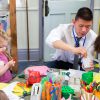While much of education is often focused on building knowledge and skills that get reflected in grades and test scores, Chris Swanson, EdD, thinks there are other aspects of learning that should be equally important.
“There is value in child engagement, happiness, overall holistic developmental and health milestones,” says Swanson, who is an associate research scientist at the Johns Hopkins School of Education.
Swanson was recently named to head a team of 46 faculty and staff on the school’s Columbia, Maryland, campus. Collectively they are known as the Institute for Innovation in Development, Engagement, and Learning Systems—IDEALS, for short. The mission is to ensure that all people, not just young children, have access to high-quality care and education throughout their lives.
Approaching education in such a holistic way, Swanson says, leads to improved lifelong outcomes. His team aims to broaden the concept of education to include the social, emotional, and physical development and well-being of the individual and their families. Ultimately, these factors are exactly those that prime an individual to be receptive to learning in the more traditional sense.
“There’s a lot of similarities between the sectors of early education and elder care,” Swanson says, “Both feature clients who are highly dependent on the workforce that care for them.”
Often, he adds, that workforce is underpaid and undertrained, yet they serve people at critical periods of life. Setting a proper trajectory for a young child and fostering engagement in later years are fundamentally important to individual well-being.
“High-quality care is critical to getting people on the path to lifelong success,” he says.
For Swanson, this level of care includes difficult-to-quantify factors such as the nurturing and engagement of learners, as well as a strong emphasis on health and well-being at every stage of life. IDEALS also advances community-based models in which strong social programs work in conjunction with education professionals well-versed in providing developmentally appropriate experiences.
Among its stated goals, IDEALS will extend its expertise in quality rating and improvement systems (QRIS) models for child care and early education to include assistive living and rehab facilities, school safety initiatives, special education, and gifted and talented education.
Though the institute officially began operation this month, Swanson and his team are well into the work of getting IDEALS prepared for expansion. The core team has been doing much of its work for a decade within the school’s Center for Technology in Education. In spinning off IDEALS as an independent program, Dean Chris Morphew of the School of Education recognized opportunities for growth and impact within the group and challenged Swanson to act entrepreneurially.
For instance, the institute will build on a multimillion-dollar grant that supported the development of the Maryland Excels QRIS, a project in partnership with the Maryland State Department of Education’s Division of Early Childhood. Swanson’s team designed a data collection system to measure the quality of more than 5,000 Maryland child care and preschool settings. IDEALS experts evaluate and rate participating programs against set standards, and publish searchable ratings on the Maryland Excels website and through its QualityFinder smartphone app. IDEALS then goes beyond simply identifying areas for improvement by providing training and technical assistance to increase program quality across the state.
The team is also working to replicate their success with Maryland Excels across the country—including in Alaska, California, and Tennessee—and beyond, with efforts in multiple provinces in China. A system-level shared-services model helps to reduce costs for all participating agencies.
Swanson’s goal with such ratings programs is to shift from a pure focus on measures like the number of books on library shelves to gain a more comprehensive overview.
“IDEALS wants to move the conversation from traditional quantitative goal posts like test scores, GPAs, and graduation rates to more qualitative and holistic measures like happiness, creativity, confidence, and health,” he says.
The focus on the combination of learning, social, emotional, and health outcomes is at the heart of another new initiative IDEALS will launch. The Responsive Healthy Outcomes Promotion and Engagement (R-HOPE) is a smartphone app–based intervention that promotes a coordinated, developmental health team approach between families and education providers, medical professionals, early-intervention specialists, and social support services.
Ultimately, the institute is looking to refocus the dialog in the broader education community around what is the desired outcome of high-quality care and educational programs. The team uses web platforms like Maryland Learning Links, Families Engage, and the forthcoming GT Discover site to promote best practices and shape the discourse on policies, strategies, and innovations.
As Swanson says, “IDEALS will be an incubator of new ideas and a test-bed of innovative educational practices.”

